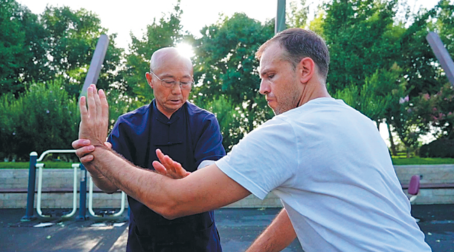Shandong mantis kung fu strikes interest in Spain

JINAN — In a classroom at the Confucius Institute of the University of Granada, in Spain, a group of Spanish students mirrored their teacher's martial arts movements — holding horse stance, jabbing with controlled force and retracting elbows in fluid arcs.
Leading them was Zhang Daojin, an inheritor of Six Harmony Praying Mantis boxing, a kung fu style originating from Shandong province in eastern China.
Zhang recently concluded a two-week cultural exchange program in Spain, sharing Chinese kung fu with martial arts enthusiasts from Spain and other European countries through lectures and training sessions.
"Chinese kung fu is much more than a way to get fit. It's rich with cultural and philosophical significance," says Alejandro Romero, a 43-year-old instructor who started his martial arts journey at 15. "It's woven into my daily routine. I've found myself growing stronger, both physically and mentally."
Six Harmony Praying Mantis boxing is celebrated for its unique blend of strength and gentleness. It focuses on internal and external training and reflects traditional Chinese beliefs about the balance between humans and nature.
In addition to boxing, Zhang also introduced tai chi and qigong (a traditional breathing exercise that strengthens the body's resilience), sparking engaging conversations about martial arts, wellness and the richness of traditional Chinese culture.
"The Spanish students are passionate, hardworking and adaptable to different cultures," Zhang says. "Some have even made the journey to Shandong several times to deepen their kung fu practice. Their commitment is truly inspiring."
Alejandro Alvarez, 45, has studied under Zhang since 2009 and runs a traditional Chinese medicine clinic in Granada.
"Kung fu has transformed my life," he says. "It has not only strengthened my body but also enriched my spirit and mind."
As Chinese martial arts continue to grow in popularity in Spain, more enthusiasts are traveling to China for training, and some have even established martial arts schools in Spain. Zhang has made several trips to Spain since receiving his first Spanish student in 2006, during which time he has shared his knowledge with thousands of students of all ages.
This growing interest reflects Spain's trend toward wellness practices that blend physical fitness with mental health, as martial arts strengthen the body and foster emotional connections.
Bu Shan, the Chinese director of the Confucius Institute at the University of Granada, says that Spain is now home to over 100 martial arts schools, and many practitioners travel to China to study every year.
Bu believes martial arts promote mutual understanding and provide a glimpse into Chinese culture.
During traditional Chinese festivals like Spring Festival or Mid-Autumn Festival, martial arts performances have become a bonding activity connecting local and Chinese communities, even "a bridge for cultural exchange", she adds.
The university's Confucius Institute is preparing for a martial arts festival in Spain and plans to send a delegation to a competition in Shandong later this year.
Isabel Maria Balsas Urena, the Spanish director of the institute, says martial arts transcend techniques.
"It's a philosophical practice," she explains.
"It instills values like respect and sharing, ultimately teaching us how to live harmoniously with one another. The principles found in Chinese kung fu resonate profoundly across different cultures."
Xinhua

Today's Top News
- Nursing home fire leaves 5 dead in Northeast China
- Xi holds talks with Uruguayan president
- Xi holds welcome ceremony for Uruguayan president
- Closer business ties with Europe expected
- Spring Festival travel rush kicks off
- China narrows semiconductor equipment gap





























